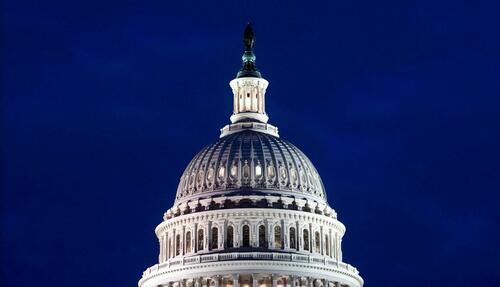Here’s What To Watch For In Congress In September
Authored by Jackson Richman, Joseph Lord, Stacy Robinson, Terri Wu, Arjun Singh, Ryan Morgan via The Epoch Times (emphasis ours),
WASHINGTON—Lawmakers are returning to Capitol Hill on Sept. 9 after a monthlong recess to work through an ambitious to-do list on a tight deadline.
Congress faces a Sept. 30 deadline to fund the government by passing new spending bills or agreeing to an extension.
 The U.S. Capitol building in Washington on Feb. 6, 2018. Saul Loeb/AFP via Getty Images
The U.S. Capitol building in Washington on Feb. 6, 2018. Saul Loeb/AFP via Getty ImagesLawmakers will also have other agenda items to address, including China, defense, and agriculture.
Hanging over all of this is the election, which will be 57 days away once lawmakers return and is likely to affect their actions and rhetoric.
Here are several things to watch for in September.
Spending
Congress’s top priority is to pass a bill by Sept. 30 that funds the government for fiscal year 2025, or it will shut down.
Congress is likely to miss the deadline and will need to resort to passing a “continuing resolution” (CR), which temporarily funds the government at levels set for the previous year without authorizing new spending.
The composition of the CR is what’s dividing Congress at present, leading to fears of a stalemate, and a shutdown. Republicans want to include in the CR a bill known as the SAVE Act, which Democrats oppose.
The SAVE Act would require voters to provide documentary proof of citizenship at the time of registration, which Republicans argue is necessary amid high levels of illegal immigration. Democrats argue the bill would disenfranchise American citizens for minor clerical errors during voter registration.
“Should Americans, and Americans alone, determine the outcome of American elections? Or should we allow foreigners and illegal aliens to decide who sits in the White House,” House Speaker Mike Johnson (R-La.) said in a debate on the bill, adding that Americans “refuse to hand over our country to illegal aliens, cartels, traffickers, and violent criminals and murderers. That’s what’s at stake.”
 Speaker of the House Mike Johnson (R-La.) speaks at a roundtable on the southern border at the U.S. Capitol on Jan. 31, 2024. Kevin Dietsch/Getty Images
Speaker of the House Mike Johnson (R-La.) speaks at a roundtable on the southern border at the U.S. Capitol on Jan. 31, 2024. Kevin Dietsch/Getty ImagesThe House of Representatives passed the SAVE Act on July 10, with 216 Republicans and five Democrats voting in favor. Many Senate Democrats, who control the body, have not publicly opposed the SAVE Act, though they are unlikely to accept a CR that includes it.
“It is already illegal for noncitizens to vote in Federal elections—it is a Federal crime punishable by prison and fines,” the Biden administration wrote in a statement opposing the bill. “The alleged justification for this bill is based on easily disproven falsehoods.”
Only five of the regular 12 appropriations bills—which allocate money to different parts of the federal government and set conditions for how it is spent—have passed the House. The Senate has advanced 11 of the bills to the floor, though none have been passed yet. Senate versions differ from the House’s, requiring further negotiations to reach compromise versions that can pass Congress.
Moreover, Republican lawmakers are seeking a long CR that would run into the next president’s term. Then, if former President Donald Trump wins the election and the GOP gains control of Congress, they would be able to enact more conservative funding bills. This is likely to be another area of disagreement with Democrats, who may seek a shorter CR that ends after the election.
Republicans and Democrats often disagree about funding priorities, and Congress has routinely been unable to pass all 12 bills in time. Fiscal Year 1997 was the last time Congress completed the budgeting and appropriations process before the Sept. 30 deadline.
The House plans to address a series of bills aimed at curbing the existential threat from the Chinese Communist Party (CCP) as part of Republican leadership’s “China Week” initiative.
More than 30 China-related bills under consideration cover a wide range of topics, including protecting U.S. farmland, trade secrets, critical infrastructure, and advanced technology.
“From economic and academic espionage to intellectual property theft, unfair trade practices, and U.S. land grabs, the threats posed by Communist China must be confronted with strength,” said Rep. Tom Tiffany (R-Wis.) of the planned blitz of counter-CCP bills.
“This week’s legislation aims to bolster our national security, protect American economic interests, defend our sovereignty, and secure our future,” he said in an emailed statement to The Epoch Times.
Tiffany’s legislation would counter a proposed pandemic treaty that critics say would give the World Health Organization (WHO) too much control over U.S. domestic affairs.
Tiffany’s bill would require a Senate vote before the United States adopts any proposed measures under the treaty, which he said “will protect our sovereignty and ensure that the safety of our citizens remains in the hands of the U.S., not a corrupt international organization.”
 Delegates attend the opening day of the 77th World Health Organization World Health Assembly in Geneva on May 27, 2024. (Bottom Left) People walk by a building.
Delegates attend the opening day of the 77th World Health Organization World Health Assembly in Geneva on May 27, 2024. (Bottom Left) People walk by a building.Several of these bills simply order studies into an issue, with some matters requiring more action—like restricting outbound investment to China and ending the de minimis privilege (which exempts shipments under $800 from tariffs) on Chinese goods—left out entirely.
With the Republicans’ four-seat majority, it’s unclear how these bills will fare in the House.
The House passed several China-focused bills earlier this year, most notably a bill forcing TikTok’s divestiture from its Chinese parent company or face a ban in the United States. That bill became law in April.
Other bills passed by the lower chamber include banning sales of crude oil from America’s strategic petroleum reserves to China, and prohibiting Chinese entities from taking contracts on building U.S. diplomatic posts.
The House passed a bill requiring sanctions on perpetrators of forced organ harvesting in China and supporting practitioners of Falun Gong, a spiritual group persecuted by the communist regime for more than two decades. Detained Falun Gong practitioners are likely the main body of victims of Beijing’s killing of prisoners of conscience for their organs, according to an independent expert panel. A companion bill was since introduced in the Senate.
Defense Funding
Congress is also expected to pass the National Defense Authorization Act (NDAA), the annual Pentagon blueprint.
Partisan riders attached to the wide-ranging bill, including measures addressing abortion and gender transitioning, could fuel debates slowing the bill’s passage. The divided House and Senate will also have to reconcile their different NDAA proposals before they can send a final bill to the president’s desk.
Read the rest here…
Tyler Durden
Mon, 09/09/2024 – 12:25












